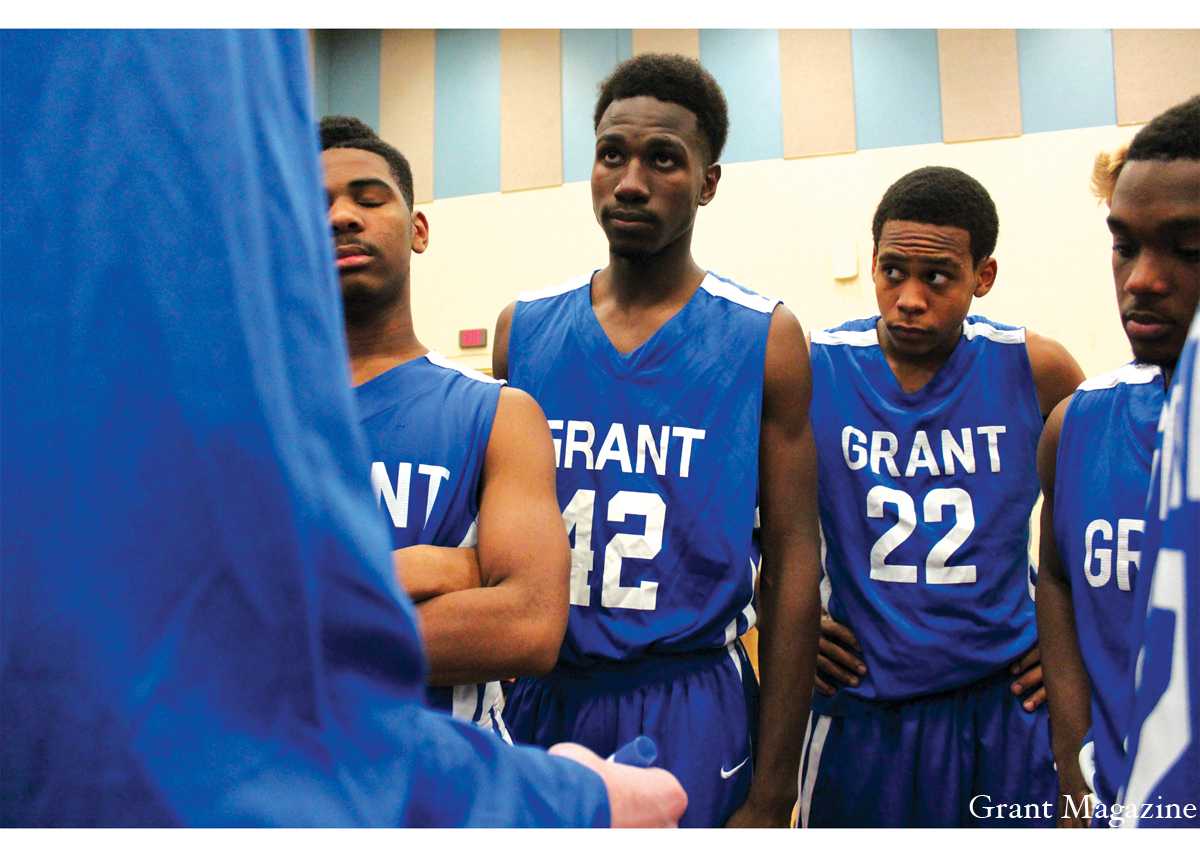“You’re going to read your name in my suicide note.”
That was the last text message from Grant junior Cierra Walker to an ex-boyfriend.
“You could tell something was off,” recalls Walker’s sister, Cheyenne, a Grant freshman. “Just sometimes the way he acted, you could tell he wasn’t a happy person.”
It was midnight on Sept. 4, 2013. Walker was lying on her bed, trying to relax after the first day of her junior year at Grant.
Walker says the ex-boyfriend berated her with text messages such as, “You’ll never amount to anything,” and “Why don’t you just die?” She had been experiencing symptoms of mental illness since she was 13 and this latest episode made her spiral further into a depression.
She sent what she believed would be her last words to the ex-boyfriend, turned her phone off and threw the device across the room. “I didn’t feel like I was in my body. I just wanted it to stop,” she remembers thinking.
Walker rushed to the bathroom and dumped a few Tylenol pills into her hand, not knowing the amount was nowhere near what was needed to kill herself. The ‘If I don’t wake up, I don’t care’ mentality was present in Walker’s mind as she gulped the pills all at once.
She fell asleep around 1 a.m. with the hope that it would be her last conscious moment. It wasn’t. Around 3 a.m., Walker was awakened after two police officers arrived at her doorstep.
The ex-boyfriend had reported to the police his suspicion that Walker was going to take her own life.
Still groggy, Walker lied and assured the cops and her mother that she was only playing a cruel joke. She was OK, she told them.
“You can always put a smile on your face, then go cry in your room,” Walker says now.
Her mother, Cindy Vanderveer, was shocked. “I was in a state of disbelief. I was angry because the boy was not a concerned friend who genuinely had her best interests at heart,” Vanderveer says.
When the police were gone and things calmed down, Walker and her mother had a heart-to-heart talk. It marked the beginning of a more open relationship for the two.
“I didn’t feel like I was in my body. I just wanted it to stop.” – Cierra Walker
“It was an eye-opener for both of us,” Walker reflects. “We’ve always had a rocky relationship.”
For the first time, Walker told her mother about the hopeless and overwhelming moods she had been experiencing for the last three years.
As someone who has always been extremely afraid of hospitals and doctors, she pleaded with her mother to not force her to get diagnosed, which would require professional tests.
Vanderveer, who works at Kaiser Permanente, negotiated with Walker and had her start taking multi-vitamins to help improve her mood swings.
For three years, multivitamins and inconsistent visits with the school counselor are the closest thing to mental health treatment Walker has had since she noticed the symptoms of mental illness. She’s never been medically diagnosed, but ever since she was 13 she has believed that there’s something wrong.
Walker is not alone.
The National Alliance of Mental Health estimates more than four million Americans age 18 and younger suffer from a mental health issue. It presents a challenge for many teens who try to maintain jobs and keep up in school. Students with mental health issues also have to deal with the negative stigmas that society attaches to those who battle such illnesses.
Mental illness in teens can be broad and far reaching. It can consist of symptoms such as dramatic changes in mood, difficulty concentrating, irrational behavior, avoidance of over-stimulating situations and an exaggerated belief in strength. Other symptoms include paranoia, unusual changes in sleep and appetite, memory problems and an array of other things.
However, it is difficult for doctors to identify and treat mental illnesses in teens because many symptoms overlap with what are normal hormonal changes that take place throughout puberty. It is not uncommon for a teenager to have mood swings, weird eating habits or an unusual sense of invincibility.
“It’s a lifelong struggle but people can do pretty well,” says Heather Washburn, a counselor in Grant’s school-based health center. “The majority of the people who do well learn how to cope.”
Walker has found that theater and drawing help her cope with overwhelming emotions. But she still experiences episodes in which she can’t sleep for days. She rearranges her entire room, decorated completely with band posters, several times. She also has episodes of depression.
September wasn’t the first time Walker thought about suicide. When she was 13, she met a boy the same age on a social networking website that was geared towards the Goth scene. The boy and Walker talked almost every day through the website for three years.
Both Walker and the boy had been fighting depression and had suicidal thoughts. The teens also used cutting, a practice in which a person cuts his or her own body to cope with stress. Walker tried her best every day to help the boy through his depression. She even introduced him to the “butterfly method” in which a person draws a butterfly over the area where they usually cut. The goal, she recalls, is to “not kill the butterfly.”
In December 2012, after a rant from the boy about his depression, she received the last message she would ever get from him. “I’m so sorry,” it said.
A few days later, Walker came home to find a new message sent to her from the boy’s account. It was from his mother, explaining that she had found him dead on his bedroom floor and she was letting all his friends know.
“After I read it, I just started crying and I went numb,” Walker recalls. “You never really think about death until it finally hits you.”
It also showed Walker how hard suicide can be for those close to the person. “It was definitely a reality check,” she says.
But even with that knowledge, it is not easy for Walker to control her emotions. “Some days you feel like you can’t even get out of bed,” she says, referring to difficulties at school. “It doesn’t help that you have to go to a place where people make fun of you.”
Portland Public Schools posts an anti-harassment statement on every page of its website. But it doesn’t always apply to the classroom, Walker says.
In her math class on a school day this fall, while the teacher was preoccupied with another student across the room, a boy gave Walker a hard time by calling her names and telling her to “go cut” herself.
Madeline Carlson, one of Walker’s friends, stood up for her. “You cannot talk to her like that,” Carlson told the boy. Only seven simple words were spoken, but the effect was great for Walker.
“You never really think about death until it finally hits you.” – Cierra Walker
“I was very offended because he doesn’t really know her,” Carlson says.
Seeing someone stand up for her motivated Walker to come to terms with her mental health issues.
“I do have people around me who do support me. I have a lot of support from people that like similar things,” Walker says. “We always help each other out.”
Even with her supportive friend group around her, Walker can’t always be shielded from her reality or the harsh comments that sometimes accompany it. Many students don’t realize how hurtful their words can be and that bullying affects more than just the one person.
“It just doesn’t seem right,” says Cheyenne Walker. “I think the guys that talk to her are the same guys that don’t really know her.”
Grant’s new health teacher, Natalie Riley, believes the negative stigma that many attach to mental illness is due to the fact that mental health is not freely talked about the same way as physical health. She is trying to change that way of thinking in the way she teaches.
“My job is to talk about the harder things,” says Riley. “The stigmas that aren’t true, I try to put out. Part of my job is to make sure everyone understands…before they are just making comments.”
In the future, Walker hopes to host depression support groups and work at a suicide hotline because she feels she could be a resource to others since she’s gone through some of the issues surrounding mental illness.
“Would you rather discuss football with someone who actually plays football or someone who doesn’t even know the sport? It’s a lot easier talking to someone who understands,” Walker says.
“If you think killing yourself is the only option, know that there is at least one other option,” Walker says. “It gets better.” ♦


































